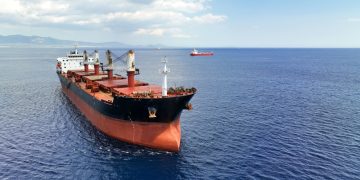Industry associations BIMCO, ICS, CLIA, IMCA, INTERCARGO, INTERTANKO and OCIMF have come together to publish security guidance applicable to navigating in the Southern Red Sea and Gulf of Aden.
The guidance follows a series of threats from and attacks by the Houthis, a Yemen-based rebel group. The group has publicly threatened to attack shipping which in their view has some affiliation with Israel. These threats have intensified and materialised since Israel’s incursion in Gaza.
The guidance emphasises the importance of conducting a thorough ship and voyage-specific threat and risk assessment considering any additional advice from the ship’s flag state before passing through the area in question.
The guidance also highlights that the maritime threat from the Houthi forces is greater in the vicinity of the Yemeni Red Sea coastline, where they are occasionally present.
Threat considerations
In the past Houthi forces have attacked merchant shipping using antiship missiles, waterborne improvised explosive devices (WBIED), and unmanned aerial vehicles (UAV). Furthermore, they have laid mines to protect port entries for ports under their control, and on rare occasion, such mines have become detached from their tether and have drifted into the traffic lanes.
Ships planning a passage through the Southern Red Sea and Gulf of Aden should conduct a thorough ship and voyage specific threat and risk assessment considering any additional advice from their flag State. The maritime threat from the Houthi forces is greater in vicinity of the Yemeni Red Sea coastline where they are occasionally present.
The Houthi threat is assessed to be directed mainly against ships identified by the Houthis as having links to Israel or Israeli nationals or ships directly associated with the Saudi-led coalition involved in the Houthi conflict with the Yemeni government.
The threat from airborne activities is probably greater during daylight hours where targets are more easily identified and attacked/boarded, but the challenge of visually detecting and classifying small contacts at night such as a water-borne improvised explosive devices (WBIED) remain.
Routing considerations
Ship owners, operators, managers, and staff should regularly evaluate the risks to their ships, including navigation and collision avoidance, and plan routes accordingly. The Master retains ultimate responsibility for ensuring vessel safety and security. It is noted that the Bab el-Mandeb Strait is narrow and when passing north bound, ships within the Traffic Separation Scheme will be no more than approximately 7 nautical miles from the Yemen coastline.
The industry recommendation to use the Maritime Security Transit Corridor (MSTC) remains unchanged in light of the recent attack. The MSTC is the amalgamation of the Internationally Recommended Transit Corridor (IRTC), the Bab el-Mandeb Traffic Separation Scheme and the Traffic Separation Scheme West of Hanish Islands, and a two-way route directly connecting the IRTC and the Bab el-Mandeb Traffic separation Scheme.
Vessel hardening considerations
Hardening measures are described in BMP5 and advice on the website www.maritimeglobalsecurity.org can be applied in areas of the ship where insertion of armed men by helicopter may be likely. Use of citadel requires thorough preparation and understanding of advantages and pitfalls – the guidelines in BMP5 applies.
Considerations regarding armed guards
Complete a thorough risk assessment when considering the use of armed guards. Caution should be taken when managing their employment and especially rules of engagement. Section 5 of the BMP5 provides detailed guidance on their employment.
Reporting
In the event of any incident, suspicious activity, or concern:
- Report any suspicious activity or concerns to the UKMTO at [email protected] +44 2392 222060
- Reports of any suspicious activity and concerns in the North Arabian Sea and the Gulf region may also be made to the European led EMASoH: Voluntary Reporting Scheme | EMASoH (emasoh-agenor.org) or call +971 52 117 1500
- If under attack, please contact US Naval Forces in Bahrain directly on +973 1785 3879


































































